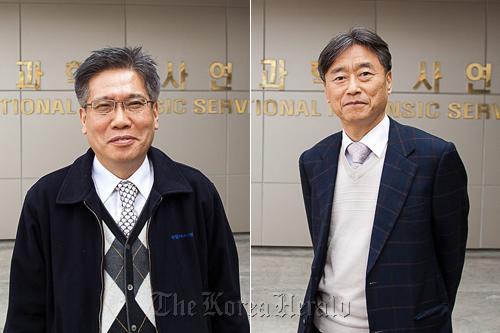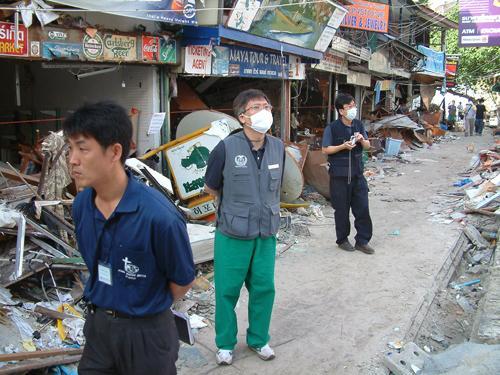Chung Nak-eun, 55, stands near his office building in western Seoul, looking at an apartment complex called DI Ville. “We call that complex the Death Identification Village,” Chung says with a grin. Coincidence or not, the rather chilling name is befitting. The apartment complex stands next to the Korean National Forensic Service where Chung works as an investigator.
What happens at the NFS behind closed doors, most people wouldn’t want to see or even imagine. It is at the NFS headquarters in Seoul and four regional offices that autopsies are carried out.
Forensics experts often work with unidentifiable remains of humans to search for even the smallest detail that can help them determine the cause of death.

Chung Nak-eun (left) and his colleague Choi Young-shik at the National Forensic Service are pursuing law changes that would give the NFS more say on when autopsies are necessary. (Yonhap News)

Chung Nak-eun (center) in Thailand after the tsunami in 2004. (NFS)
“We do this work for society,” says Choi Young-shik, a 54-year-old medical examiner at the NFS.
Work starts at 9 a.m. in the big autopsy room where six steel examination tables are lined up facing the wall at a perfect 90 degree angle. Everything in the room is neatly organized. Air circulates through a special system, blowing the air in from the ceiling and sucking it out through the floor. This is to prevent bad air and smells from lingering in the facility.
“Before we start, we gather information about the dead person on the table,” says Chung. The information comes from files provided by the prosecutor’s office, police reports and notes taken before the autopsy is undertaken. “Depending on the case, an autopsy takes one to two hours,” Chung explains. “If it is a very difficult case, it can take up to four hours.”
What the forensic experts examine day to day are “medical accidents” ― people who have died in hospitals ― and sometimes suicides and victims of car accidents. Right next to the main building of the NFS is a special facility where traffic accidents are examined. Crashed cars get piled up in front of the building resembling a garage.
Some cases are easier to deal with than others. The harder ones are when the body arriving on the surgery table is not looking much like a person anymore. “We are humans; we have feelings,” says Chung. Child cases very often end up on his table because others don’t want to deal with them.
Chung is one of those people who joined NFS by chance. A former doctor, he was dragged into forensics when Seoul’s Sampoong Department Store collapsed in June 1995, killing 501 people in what is recorded as South Korea’s largest peacetime disaster. After taking part in the examination of the victims, Chung decided to pursue this career. He says it is humanity, sacrifice, philosophy and religious beliefs that enable him to withstand his job day-to-day.
In 2004 when the tsunami swept through Southeast Asia and left thousands of people dead, Chung led the Disaster Victim Identification team sent from Korea. The DVI team had to recover clues piece by piece ― jewelry, fingerprints, teeth ― to identify the victims.
Chung, together with his colleague Choi Young-shik, has now embarked on a different kind of mission ― changing the country’s law so that the NFS gets more say in the decisions on whether to conduct an autopsy.
Under the law, it is the police, often a specially trained crime scene investigation team, that recommend to the prosecution whether an autopsy is necessary. But the NFS says police are not medical examiners and lack knowledge required to make such decisions.
Suicides, for example, are sometimes very tricky, say experts at the NFS. But despite potential doubts, only around 3 percent of approximately 15,000 cases were looked into by the NFS in 2009.
South Korea has the highest suicide rate among 34 OECD (Organization of Economic Cooperation and Development) countries, averaging 42 suicides per day. NFS officials say an autopsy can put to rest cases where family members raise doubts.
Such is the case of a young Filipino marriage migrant found dead, hanging from a wooden beam in an abandoned house in Gongju in January 2011. The police concluded suicide, prosecutors decided not to order an autopsy, and the case was closed. Doubts voiced by the woman’s family in the Philippines, a questionable Filipino autopsy report and intervention by migrant worker activists led to a reopened case.
Chung, back then in charge of the NFS Central District office in Daejeon, was ordered to reinvestigate the case in April 2011.
Based on photos of the woman’s body, he concluded it had been a suicide. If the NFS had been given a say, the woman probably would have been examined back in January 2011, before being transferred to the Philippines.
Other unresolved or wrongly concluded death cases in Korea also speak for the NFS’s position. Yoo Young-kyu, a reporter with local daily Seoul Sinmun, has an extensive publication on cases in which an autopsy could have significantly changed the investigation results ― 30 plus cases of suicides and other often controversial deaths have been reinvestigated by the journalist. “The legal system on autopsies in Korea needs a revision,” he says.
“That will come eventually,” says Kim Il-su, president of the Korean Criminology Association and law professor emeritus at Korea University, admitting there are clear diverging interests among the police, prosecution and the forensic experts of the NFS. A reform of the legal system that is likely to come, maybe as early as this year, will probably weaken the voice of prosecutors in favor of forensic experts. “Forensic medicine has for very long just been an auxiliary science for prosecutors and judges,” says Kim. He sees forensic science getting ahead of the others because of recent scientific developments and the certainty scientific investigations deliver when dealing with questionable cases.
The prosecution, asked to comment on the issue, declined.
In the meantime, Chung pushes through his daily mission.
Although he witnesses the worst facets of death all day, he says he still celebrates life. He constantly smiles while talking about his job. It is obvious Chung loves what he is doing. (Yonhap News)


![[AtoZ into Korean mind] Humor in Korea: Navigating the line between what's funny and not](http://res.heraldm.com/phpwas/restmb_idxmake.php?idx=645&simg=/content/image/2024/04/22/20240422050642_0.jpg&u=)
![[Exclusive] Korean military set to ban iPhones over 'security' concerns](http://res.heraldm.com/phpwas/restmb_idxmake.php?idx=645&simg=/content/image/2024/04/23/20240423050599_0.jpg&u=20240423183955)



![[Graphic News] 77% of young Koreans still financially dependent](http://res.heraldm.com/phpwas/restmb_idxmake.php?idx=645&simg=/content/image/2024/04/22/20240422050762_0.gif&u=)